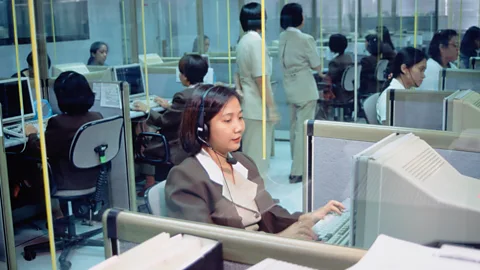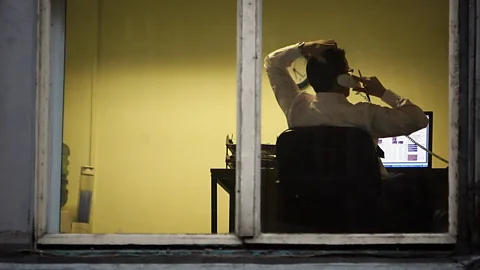Why being offline is overrated
 Getty Images
Getty ImagesThe Tweet went out at 21:15 and for hours nobody answered it.
By the time YouTurn CEO Mark Babbitt saw the tweet three hours later, still nobody had responded. Dismayed, Babbitt fired off an email to his staff that began: “How could we let this happen?”
Fortunately, it wasn’t anything major, just a technical question about the website for YouTurn, which helps students find internships. But it was at that point that
Babbitt realised he needed to figure out a balance — for himself and his employees. Could he really chastise his staff for not being available every minute, night and day?
“That’s when I realised I can’t be doing this. I can’t be that boss who wants everyone to be online at all hours,” Babbitt says.
So he instituted a “first responder” schedule. Now, there’s someone on call from his company to respond to reviews or answer emails at any time, making sure the company never misses a late-night tweet or online customer interaction.
 Alamy
AlamyIt’s a novel approach to the reality of today’s business. Any company that serves an internet audience — and that’s nearly everyone now — no longer has a traditional nine-to-five day. That makes the line between work and the rest of life more blurred than ever.
For managers, that means navigating how to ask employees to work outside of their regular hours. It’s a balance between respecting their personal time and getting things done. And believe it or not, sometimes it’s about making sure your employees know you value them by asking for more of their time.
Raised by technology
It’s millennials who have led to this fairly recent change, says Tien Tzuo, founder and CEO of the San Francisco tech company Zuora, which helps companies build web-subscription services. When millennials started working, they didn’t have a separate phone for business and another for home; their email inboxes showed both personal and work emails; and they were more likely to use social networking to connect with friends and clients. To them, work and life are all one endeavour.
 Alamy
AlamyThat’s how it should be, says Tzuo. “I don’t frame it as the old rules are broken, but I do think the millennials unlocked the natural state of how we ought to work,” Tzuo says. When talking about this with his staff, he likes to reference this quote from Voltaire, “Work saves us from three great evils: boredom, vice, and need.”
What that means in his office is that Tzuo expects, at pretty much all hours of the day, to find his employees available by messenger or email or text. When he logs into a cloud-based document at 22:00 at night, to tweak a presentation for the next day, he’ll often find several other employees in there already.
Tzuo knows some will see this as asking too much of his employees. Research shows that having a healthy work-life balance can improve productivity, but Tzuo argues that many industries nowadays simply don’t have that luxury.
 Alamy
AlamyBut Tzuo also says being basically on-call at all hours also should afford workers the ability to carve out personal time during what used to be the traditional workday. That’s why Tzuo doesn’t feel bad ducking out, as he did a few months ago, when he took his 7-year-old daughter to the dentist to have her tooth pulled.
“You want to take advantage of these moments in time. You also have to make sure to be understanding when your employees want to take advantage of these moments,” Tzuo says. “You have to be sensitive that your employees are human beings who are going to be available at night and weekends sometimes, but then also are going to want to disappear sometimes.”
The 24-hour workday
The fear with asking employees to be available all day every day is that they could burn out quickly. But Joe Cross, general manager of the money transfer service TransferWise, says there’s a way to prevent it.
The antidote to this 24-7 work cycle is making sure employees buy into the company’s mission. Status and salary are no longer enough, Cross says, because now employees want a sense that they’re doing something good.
“The worry about whether employees should be available on email at all hours goes away when it’s something they believe in,” Cross says. “If it’s a mission they can get behind, they will want to be working all the time.”
At TransferWise, a company initially founded in Estonia, Cross oversaw the expansion from Europe to his native London, and then to the US. Having a company spread across so many time zones meant an increase in what he traditionally saw as work hours. Then the company headed to Australia, and now the workday never ends. At his office, everyone is on the messenger service Slack. Often he’s getting, and sending, messages saying “good night” right before going to sleep for the night.
 Getty Images
Getty ImagesThat says, bosses need to be understanding when an employee says they can’t do something outside of nine-to-five work hours, Cross says. He caught himself once, typing out an email with his left hand as he held the book Chocolate Moose for Greedy Goose in his right hand as he was reading it to his daughter. “That really made me aware that maybe the line had been crossed and maybe I need to back down a bit,” Cross says. “Now I actually will be offline, and now I understand if my employees need to be as well.”
When offline isn’t OK
For younger workers especially, being offline isn’t always seen as a good thing, says Babbitt, co-author of the book A World Gone Social. Millennials don’t want to be the only one at the bar without an important email to answer, or simply never fielding texts from the boss.
“If they’re the only one who isn’t in demand, they’re going to have this fear of missing out, this sense that maybe they’re not valued,” Babbitt says.
But managers also have to be good mentors, Babbitt says, and that means also encouraging employees to set some boundaries about when they’re going to be unavailable.
As for Babbitt, he created a “first responder” policy that assigns one person to be on-call to respond to late-night web issues. The policy has meant he hasn’t needed to fire off late-night emails chastising staff. “We now live in a testimonial economy, where so much is dependent on reviews,” Babbitt says. That means responding quickly.
But it also means that, as a manager, you’re also getting a review from your employees.
“We used to wonder about whether we should ‘friend’ our employees on social networking,” Babbitt says.
Now those days are over because managers too need positive reviews from the people who report to them. And that means figuring out how to manage your staff’s 24-hour workdays without being overbearing.
